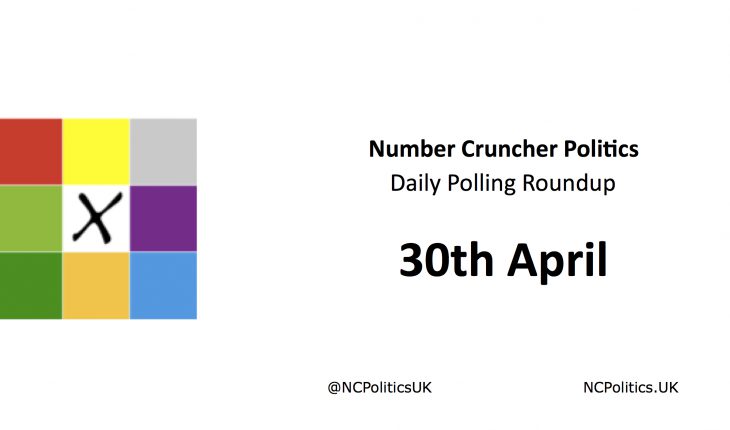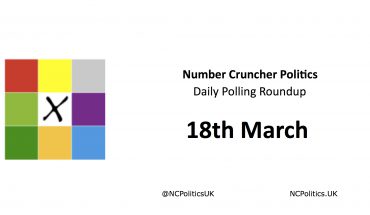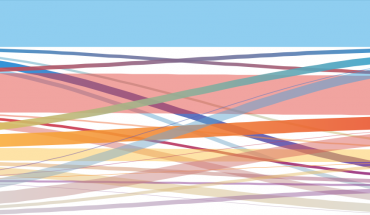One week to go! The main political event of the day was the BBC Question Time leaders' event in Leeds. The only snap poll was by ICM for the Guardian:
ICM/Guardian (winner): Cameron 44 Miliband 38 Clegg 19 #GE2015 #bbcqt
— NumbrCrunchrPolitics (@NCPoliticsUK) April 30, 2015
So a win for Cameron, but whether this or not this has any broader impact remains to be seen. In voting intention polls (all of which, to be clear, predated tonight's event), we had three releases, starting with MORI's poll for the Evening Standard:
Ipsos MORI/Evening Standard: CON 35 (+2) LAB 30 (-5) LIB 8 (+1) UKIP 10 (=) GRN 8 (=) Fieldwork 26th-28th April N=1,010 Writeup #GE2015
— Matt Singh (@MattSingh_) April 30, 2015
This was a very substantial move, so it got plenty of attention. For those not familiar with polling methodology, MORI is unique in using what used to be called "unadjusted" voting intention figures, citing recall error as a reason for not using political weighting. There is no "right" or "wrong" approach, but methodological differences can have a significant impact. So when big moves happen, the sample composition is often the first place to look.
What's interesting is that this sample has the same number of 2010 Conservative and Labour voters, whereas the actual 2010 mainland vote shares (remember – opinion polls do not include Northern Ireland) were CON 36.9, LAB 29.7, a difference of 7.2 points. Pollsters that weight by past vote generally allow for false recall, so the gap in weights often tends to be more like 5.5 points (exactly as MORI’s recalls have averaged over the past year or so). So with adjustment, the Tory lead would have been a few points bigger still – Labour’s 2010 retention rate was only 63%.
All usual caveats about individual polls apply. But what actually caused such a move? Looking at the tables, most of the shift was driven by a large swing in socioeconomic groups DE. Slightly more than half of this was a reversal of the swing in the opposite direction in the previous poll – on that occasion it was offset by a swing towards the Tories among ABC1s, whereas in today’s poll, all groups besides C2s moved the same way. Over all three polls, DEs have certainly moved a lot – but as a demographic that tends to be less politically engaged, it’s not unreasonable to think that they might make up their minds later than others. So while I would treat any number like this with caution, there’s nothing outrageous in the tables, and a 4 or 5 point Conservative lead sits right between fellow phone pollsters ICM (3pts) and Ashcroft (6pts), with ComRes having shown a tie in its latest poll but broadly similar figures in its other recent phone polls.
One positive sign for Labour in this poll was that Ed Miliband’s net satisfaction among his own voters has gone from +32 to +50. But better news came from online polls – Panelbase again showed a Labour lead:
Panelbase: CON 32 (+1) LAB 34 (=) LIB 8 (+1) UKIP 17 (=) GRN 4 (=) Fieldwork 29th-30th #GE2015
— NumbrCrunchrPolitics (@NCPoliticsUK) April 30, 2015
While YouGov/Sun flipped back to a one-point Labour lead:
YouGov/Sun: CON 34 (-1) LAB 35 (+1) LIB 8 (-1) UKIP 12 (=) GRN 5 (+1) Fieldwork 29th-30th (before #bbcqt) Daily roundup to follow #GE2015
— NumbrCrunchrPolitics (@NCPoliticsUK) April 30, 2015
And finally, from this morning’s MORI breakfast briefing:
The voters aren't cynical… (From the @IpsosMORI briefing) pic.twitter.com/BHvoR4Mo03
— Matt Singh (@MattSingh_) April 30, 2015
Tomorrow we’ll get Populus/FT and YouGov/Sun. Most leaders’ events have been followed up pretty sharply by a number of polls and I wouldn’t expect anything different this time. Update (23:55): That didn’t take long – Survation/Mirror poll with post-debate fieldwork confirmed for tomorrow!



